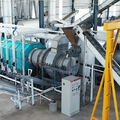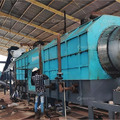In the relentless pursuit of sustainable solutions to address the global plastic crisis, innovative technologies have emerged to convert plastic waste into valuable resources. One such groundbreaking approach involves the conversion of plastics into fuel. This post explores the intricacies of plastic-to-fuel conversion, delving into the processes, environmental implications, and the potential of this technology to revolutionize waste management.

Understanding Plastic-to-Fuel Conversion:
Plastic-to-fuel conversion is a process that transforms discarded plastics into various forms of energy, such as liquid fuels like diesel or gasoline. This technology seeks to mitigate the environmental impact of plastic pollution while simultaneously providing an alternative source of energy. The process typically involves thermal depolymerization, pyrolysis, or gasification, each offering distinct advantages in terms of efficiency and output.
Thermal Depolymerization:
Thermal depolymerization involves subjecting plastic waste to high temperatures and pressures in the presence of a catalyst. Under these conditions, the long-chain polymers in plastics break down into simpler hydrocarbons. The resulting hydrocarbons can then be refined into liquid fuels such as diesel or gasoline. This process mimics the geological conditions under which fossil fuels are formed but occurs at a much faster rate.
Pyrolysis:
Pyrolysis is a plastic conversion to fuel machine that involves heating plastic waste in the absence of oxygen. The absence of oxygen prevents combustion and encourages the breakdown of plastics into gases, liquids, and solid residues. The liquid fraction, known as pyrolysis oil or bio-oil, can be further refined into fuel. Pyrolysis offers the advantage of being able to process a variety of plastic types, including mixed plastics, without the need for sorting.
Gasification:
Gasification involves the partial oxidation of plastic waste at high temperatures, producing syngas—a mixture of hydrogen, carbon monoxide, and methane. Syngas can be used as a fuel directly or further processed into liquid fuels or chemicals. Gasification is known for its ability to handle a wide range of feedstocks, providing flexibility in the types of plastic that can be converted.
Environmental Implications of Plastic-to-Fuel Conversion:
Reduction of Plastic Pollution:
One of the primary environmental benefits of plastic-to-fuel conversion is the reduction of plastic pollution. By diverting plastics from landfills, oceans, and incineration, this technology addresses the root cause of environmental degradation associated with plastic waste.
Energy Recovery and Resource Conservation:
Plastic waste is a rich source of carbon, and converting it into fuel provides a means of recovering energy from a material that would otherwise be considered a pollutant. This not only contributes to energy independence but also conserves natural resources that would be used in the production of traditional fuels.
Mitigation of Greenhouse Gas Emissions:
The conventional breakdown of plastics through incineration releases greenhouse gases into the atmosphere. Plastic-to-fuel conversion processes, if executed with proper emissions controls, can mitigate the release of these gases. Additionally, the resulting fuels can serve as lower-carbon alternatives to conventional fossil fuels.
Circular Economy Approach:
Plastic-to-fuel conversion aligns with the principles of a circular economy by transforming waste into a valuable resource. Instead of viewing plastic as a single-use item with a linear lifecycle, this technology integrates plastics into a circular system, promoting a more sustainable approach to material use and disposal.
Challenges and Considerations:
Economic Viability:
The economic feasibility of plastic-to-fuel conversion is influenced by factors such as the cost of raw materials, technology infrastructure, and the market demand for the resulting fuels. For widespread adoption, it is essential to bridge the gap between the cost of traditional fuels and the cost-effectiveness of fuels derived from plastic waste.
Technology Maturity and Efficiency:
Some plastic-to-fuel conversion technologies are still in the early stages of development, and their efficiency may vary. Advancements in technology are necessary to enhance conversion rates, energy efficiency, and the overall economic viability of these processes.
Feedstock Quality and Contamination:
The quality and composition of plastic feedstock significantly impact the efficiency of conversion processes. Contaminants in the form of non-plastic materials, such as paper labels or metals, can negatively affect the conversion and refinement processes, necessitating proper sorting and preprocessing of plastic waste.
Regulatory Compliance:
Regulatory frameworks play a crucial role in the acceptance and implementation of plastic-to-fuel technologies. Striking a balance between environmental benefits and potential risks requires clear guidelines and standards to ensure the safe and responsible deployment of these processes.

Promising Developments and Innovations:
Advanced Catalysts:
Ongoing research focuses on developing advanced catalysts to enhance the efficiency of thermal depolymerization processes. Catalysts play a crucial role in accelerating reactions and optimizing the yield of valuable hydrocarbons from plastic feedstock.
Hybrid Approaches:
Hybrid approaches that combine different conversion technologies are being explored to capitalize on the strengths of each method. Integrating pyrolysis with gasification or thermal depolymerization can result in more comprehensive and efficient plastic-to-fuel conversion processes.
Community-Based Initiatives:
Grassroots initiatives and community-based plastic-to-fuel projects are gaining traction. These projects often focus on decentralized conversion facilities that address local plastic waste issues while generating energy for the community.
Conclusion:
The conversion of plastic waste into fuel represents a transformative approach to waste management and energy production. By harnessing the untapped energy potential of plastic materials, this technology not only addresses the urgent need to reduce plastic pollution but also contributes to a more sustainable and circular economy. While challenges remain, ongoing research, technological advancements, and a commitment to regulatory frameworks can pave the way for a future where plastic waste is viewed not as a problem to be discarded but as a valuable resource to be repurposed for the benefit of both the environment and society.





